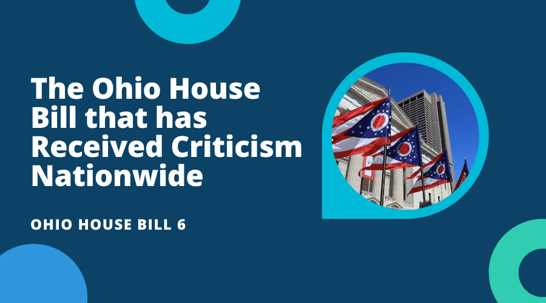July 23, 2019
On July 23, 2019, Ohio Governor Mike DeWine signed House Bill 6 (HB 6) after it passed 51-38. This bill received immediate attention and criticism nationwide from all environmentally advocacy groups, as Ohio legislators were making the choice to sacrifice renewable and efficient energy solutions to subsidize inefficient energy sources.
Under this bill, Ohio electric customers would see a couple of additional charges on their monthly bill from 2021 and 2027. These new charges would primarily be used to subsidize two nuclear plants (Davis-Besse and Perry, both owned by Energy Harbor – a former subsidiary of FirstEnergy Corp.) and two coal plants in Ohio and Indiana run by the Ohio Valley Electric Corporation.
To offset these new charges, the bill slashes mandates on both renewable energy and energy efficiency. The previous mandates in Ohio were for utilities to get 12.5% of their power from renewables by 2027 and to reduce customers' energy usage by 22% by 2027. HB 6 dials these mandates way back, effectively negating any reason for utilities to continue to pursue renewables and efficiency in the coming years.
Lawmakers have stated that this will save ratepayers more on their electric bill in the short-term than the new surcharges would cost them, but that analysis is an oversimplification that doesn’t consider additional benefits and cost savings, short-term and long-term. Halting the shift toward renewables and efficiency is halting the shift toward cleaner and cheaper energy.
The Ohio Environmental Council Action Fund and Environmental Law & Policy Center found that those savings averaged $7.71 per month for Ohio customers. Using that figure, it is estimated that customers would actually be paying significantly more under HB 6 than they would without it.
February 26, 2020
Some of the major utilities in Ohio immediately started to question the timing of this, stating they believed there was a need for a wind down period to develop a plan to shut down their efficiency programs. The Public Utility Commission of Ohio (PUCO) and Order on February 26, 2020 to clarify how utilities were expected to respond to HB 6 and stated that utilities would have until September 30, 2020 to begin their wind down period, with all programs ending by December 31, 2020.
Each of the major utilities in Ohio is currently advertising that they will be winding down or shutting down their energy efficiency programs starting September 30th.
July 29, 2020
On July 29th, a federal grand jury indicted the Ohio Speaker of the House, Larry Householder (R) and four others, alleging a conspiracy that involves about $60 million to encourage passage of the nuclear plant bailout.
Court documents have stated that an energy company had been funneling funds into Generation Now, an entity that was established in 2017 by Householder’s longtime political strategist to “promote energy independence and economic development.”
It is alleged that the money that was sent to Generation Now was used in a number of ways, including promoting Householder and other candidates they believed would support the bill and personal benefits to Householder himself, by settling a personal lawsuit and paying off credit card debt.
You can read more on the indictment on the DOJ website here.
Today
In recent months, the calls to repeal HB 6 have only intensified. The original arguments against the bill still remain, that the bill is a step backwards from the progress being made on renewables and efficiency and not actually a cost saver for residents and businesses of Ohio. The alleged corruption that led to the bill’s passage have only fueled the fire.
Conversations continue about the timeline to repeal HB 6, if it will be repealed at all is still up in the air. While some are arguing there are pieces of the bill that can be salvaged, many of its opponents are pushing for a full repeal and a clean start after all that has happened with the bill over the past year.
As the end of September is here and no repeal has come to pass, utility rebate programs in Ohio are set to close or wind down.
We will continue to monitor this situation closely.
.png?width=500&name=2019%20e%20news%20spotlight%20logo%20(1).png)





